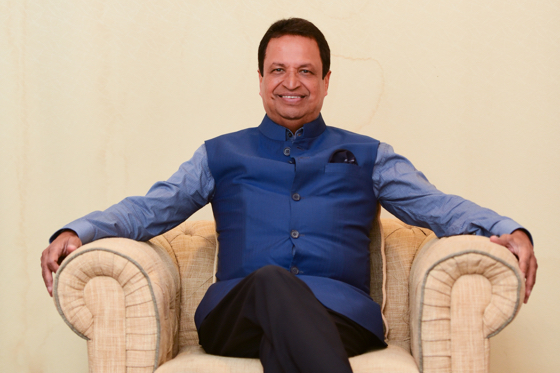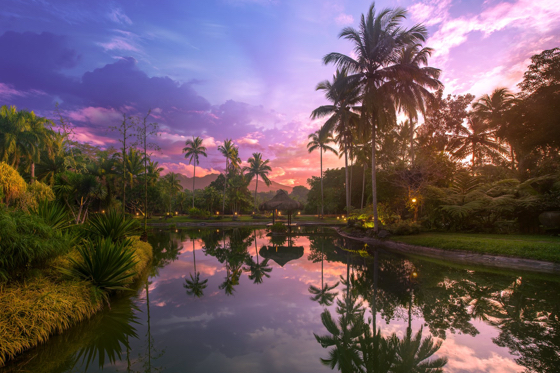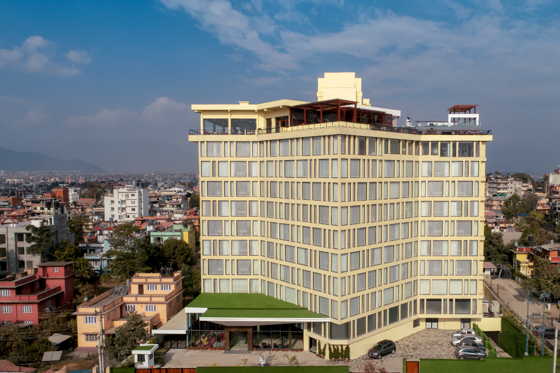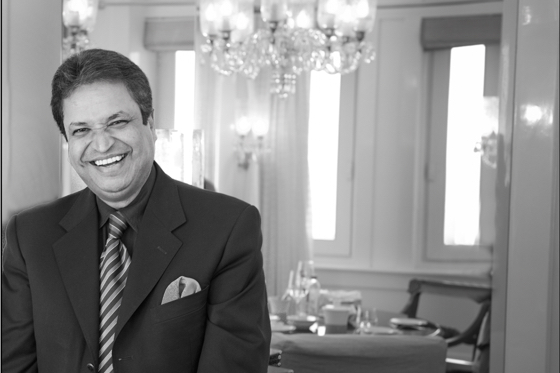When you continually develop your personal values by following the teachings of spiritual leaders like Sri Sri Ravi Shankar, you are not as easily shaken by a pandemic like COVID-19, or even the devastating earthquake that rocked Binod Chaudhary’s homeland of Nepal in 2015. Instead, you dig in.
For the chairman of Kathmandu-based conglomerate CG Corp Global, his teachings have helped him learn one thing that he said is endless – an inner and deepening determination that his businesses and teams will continue their journeys, and to be part of the solution by providing so much humanitarian relief when crises like the 2015 earthquake emerge.
“We’re not going to stop,” he said. “If your vision is clear, and if you believe in your vision and your idea, and if you have the determination to convert that idea into a reality, resources will follow.”

Part of that endless optimism and a belief that good karma brings goodwill is focused on hospitality, a journey that began in 1999 when Chaudhary bought a hotel in politically charged Colombo, Sri Lanka, recognizing an opportunity to buy at a steep discount and an eventual bright future in the countr. It was rebranded with India’s Taj brand, with whom CG has partnered with time and time again in India, the Maldives and more recently in Dubai.
Nepal’s only billionaire, as identified by Forbes, along with his son Rahul, now managing director of CG Hospitality Holdings, have since built a group with 106 hotels and 5,512 keys open and another 28 hotels with 2,049 rooms under development across 12 countries and 93 destinations. In India alone, CG Hotels & Resorts operates some 60 hotels under the Fern, Zinc and Beacon brands. Just recently, CG Hospitality added East Africa to its expansion with the acquisition from Saudi Prince Alwaleed’s Kingdom Holding Co. of the Fairmont Mara Safari Club and Fairmont The Norfolk in Kenya.
Last year, the valuation of CG Corp Global stood at approximately US$2.6 billion and the hospitality vertical sat at close to US$500 million, according to Rahul Chaudhary. Goals include reaching a US$1 billion valuation for the hospitality group in five to 10 years and to grow the portfolio to some 200 hotels by 2025.

Among the major growth initiatives is expansion of its home-grown — and perfect for the moment — wellness concept called The Farm. CG plans to add 14 keys at the first Farm at San Benito, Philippines, which continues to perform very well through the pandemic, and build a second property in Phuket, Thailand, with some 71 keys. At press time, CG was also close to completing a deal for The Farm in Croatia, and was exploring further opportunities in Nepal and the Middle East.
About availability, trust
Binod Chaudhary, 65, heads an empire with 90-plus companies and 60 brands, ranging from electronics and telecom to fast-food noodles. His biggest assets are a controlling stake in Nepal’s Nabil Bank and CG Foods, maker of the popular Wai Wai noodles. He is following in the footsteps of his grandfather and father, who developed successful textile and clothing businesses. At age 18, Binod’s father was diagnosed with heart disease. Instead of heading off to university, he started running the family business.
Chaudhary is a firm believer in long-term business relationships built on availability and trust. “Even in difficult times, your people should feel that, yes, you will deliver what you promise. So, promise is another word that matters to me,” he said in a late July interview with HOTELS.
He also believes, despite being warned otherwise, in following his intuition when it comes to making business decisions. “I don’t think there is any science to calculating risk. I think it’s the gut feeling of an entrepreneur which plays the most decisive role,” he said.
Of course, he has his teams and experts that do their due diligence and review the metrics, but in the end, Chaudhary said, “no business school, nor any book or big investment bankers help you decide on the final hour when you have to take a decision. I think it’s the gut feeling and your own judgment as an entrepreneur. At least that’s what I have always felt.”
Reengineering hospitality
Today, Chaudhary’s gut is telling him it’s time to value-engineer the group’s hotel business, review cost structures and renegotiate with lenders where they are involved. About 90% of the portfolio is open in one form or another – some only focused on F&B business with maybe a few floors open for guests. “There has to be a new modeling. The philosophy, the blend of people and the spaces will have to be re-orchestrated,” he said.

He points to multitasking, a reduction of staff and “no more luxury of three people opening the door and presenting a flower at the entrance of the hotel, all those are gone forever,” he said. “Luxury will have to be compromised, costs will have to be compromised in a way to make the structure far more efficient. To beat break-even points will become much more logical. Ultimately, no matter how much cost rationalization you do, you need some revenue.”
And ultimately, it boils down to the family pumping in more equity to sustain the hotel business, Chaudhary added. “Thankfully we have multiple business verticals, and many of our verticals continue to do well. So, we will survive and we will not be pushed to a situation where we’ll have to exit. But I don’t think everybody is in that position,” he said, referring to the inability of many hoteliers to manage the high cost of capital in parts of the region, as well as a lack of fiscal stimulus from governments.
“The perception continues to remain that generally the hospitality business is a rich man’s business, and they can afford to continue to fund forever,” Chaudhary said. “So, there is very limited relief, stimulus and support. If the business doesn’t come back, at least to a level where you can break even, I think you will see lots of hotels shutdown forever.”
In fact, Chaudhary is not very bullish on the hotel space considering the current state of affairs and expects consumer’s travel habits, especially business travel, to change. “No, I’m not bullish,” he said. “I will have to reengineer the business philosophy and business model. We’ll have to come up with new, innovative ideas. There may have to be some internal restructuring of the businesses and moving focus from one segment of the property to another. Those things will happen.”
Channeling spirit
Bigger picture, Chaudhary remains resolute and said he will continue to grow the group’s hotel business, believing the focus should not be so much about merely selling rooms and more so on creating lifetime memories for guests. “We can’t say that the same degree of spirituality and unforgettable memories and experiences can be created in every property. But thankfully in our case, we’ve been able to do it in many of our properties,” he said. “And that’s what gives me a great degree of pleasure.”

Chaudhary likes to point to The Farm at San Benito, the Taj Exotica Maldives and the Meghauli Serai, a Taj Safari in Nepal’s Chitwan National Park. “When I mention those our guest’s eyes pop out, and they cannot forget the time they spent there,” he said.
The other aspect of the business crucial to CG Hospitality, said Chaudhary, is the impact its properties create within the communities and the differences they make. “They have to become part of the play,” he said. “It’s not only providing employment and CSR. There has to be a built-in component of bringing the hotel and community together so that they coexist and grow – both in terms of the human qualities and qualities of life. This is what fascinates me. Whenever I look at it from any of my wildlife-related safari camps, we cannot survive without working with the local communities at every step. It’s an amazing journey.”
In one local community, CG Hospitality is working with owners to upgrade their very modest lodges used to house trekkers and hikers exploring the Shey Phoksundo National Park in the Dolpo region. A CG-led eco-lodge project is supporting and reviving existing hotels and lodges in the region. Started in 2017, six lodges along the Juphal-Dunai-Shey Phoksundo trail have been identified and CG is helping provide basic necessities as well as aesthetics to increase the hotel owners’ income which would, in turn, benefit the broader community.
Among the goals is to fund this series of lodges [free of charge] and train their teams on service and hygiene practices. “I call it a true form of a social business,” Chaudhary said. “The important lever is to create something which will change the lives of the people of that area.”
Chaudhary further points to how spirituality is becoming an integral element of life, especially with it remaining so imbalanced and incomplete. “My guru Sri Sri Ravi Shankar says that the materialistic world, the capitalistic world or businesses, they operate as if they’re cutting the cloth. But there has to be somebody to sew it back,” Chaudhary reflected. “And that’s what spirituality does. You need both to have a perfect balance of life, and life without balance is something which you will not be able to live too long. And you can create these spiritual experiences, you can incorporate these elements in what you do in your hotel business. To me, the hotel business is not just brick and mortar. A hotel without soul is just yet another building, yet another physical structure.”
In the end, Chaudhary defines himself as a small man from a small country with big dreams. He repeated that by believing in his visions and ideas, and having the determination to convert those ideas into reality helped generate the needed resources. “I think it’s about a man who had no boundaries, who always believed in opening frontiers,” he said.

